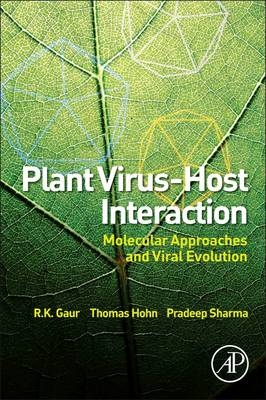
Plant Virus-Host Interaction
Academic Press Inc (Verlag)
978-0-12-411584-2 (ISBN)
- Titel erscheint in neuer Auflage
- Artikel merken
Plant Virus-Host Interaction contains cutting-edge research in plant molecular virology, including pathogenic viroids and transport by insect vectors, interference with transmission to control viruses, and synergism, with pivotal coverage of RNA silencing and the counter-defensive strategies used by viruses to overcome the silencing response in plants.
With a clear focus on plant virus evolution, including quantitative and population genetics, Plant Virus-Host Interaction provides insights on the major factors favoring disease emergence, such as genetic change in pathogen and host populations and changes in host ecology and environment. The book also examines socioeconomic implications of widespread plant viral agents. Contributions from leading experts around the globe provide varied perspectives, while comprehensive coverage ensures a complete look at this exciting field.
Prof. (Dr.) R.K. Gaur earned his Ph.D. in 2005, and is now a Professor at the Department of Biotechnology, Deen Dayal Upadhyaya Gorakhpur University, Gorakhpur, Uttar Pradesh, India. His Ph.D. was on the molecular characterization of sugarcane viruses, i.e., mosaic, streak mosaic, and yellow luteovirus. He received a MASHAV fellowship of the Israeli government for his postdoctoral studies and joined The Volcani Center, Israel and Ben-Gurion University, Negev, Israel. In 2007 he received the Visiting Scientist Fellowship from the Swedish Institute, Sweden to work at Umea° University, Umea°, Sweden. He received a postdoc fellowship from ICGEB, Italy in 2008. He has made significant contributions on sugarcane viruses and has pub lished 130 national/international papers, authored 17 edited books and presented about 50 papers at national and international conferences. He has been honored as a Fellow of Linnean Society, a Fellow of the Royal Society of Biology, a Fellow of the Society of Plant Research, a Fellow of the Society of Applied Biology (FSAB), and a Fellow of the International Society of Biotechnology (FISBT). He has received many other awards, including the Prof. B.M. Johri memorial Award, Society of Plant Research (SPR); Excellent Teaching Award by Astha Foundation, Meerut; UGC-Research Teacher Award; Young Scientist Award in 2012 in Biotechnology by the Society of Plant Research (SPR), Meerut; and Scientific and Applied Research Center Gold Medal Award in 2011 for outstanding contribution in the field of Biotechnology. He has visited several laborato ries in the United States, Canada, New Zealand, United Kingdom, Thailand, Sweden, and Italy. Currently, he is han dling many national and international grants and international collaborative projects on plant viruses and disease management Dr. Sharma’s research focuses on Agriculture Biotechnology, specifically on the characterization of genes and SSRs for abiotic stresses (drought and heat) and understating the role of epigenetics, Gene silencing and small RNAs in for wheat improvement. He has been associated with several networking projects funded as Agri-Bioinformatics Promotion Program, ACIAR-DST, and DBT-BBSRC, ICAR Networking projects on AMMAS, Cabin and AMAAS schemes etc. He has published 90 peer reviewed papers, editor of six books published in CRC, Elsevier and Academic Press, and 20 book chapters. Dr Sharma has been associated with a recently released bread wheat variety DBW71 and three trait specific genetic and has been awarded with ICAR-Lal Bahadur Shastri Outstanding Young Scientist Award, NAAS- Young Scientist 2007 and ISCA- Pran Vohra Awards. Dr Sharma is Chief Editor of Journal of Cereal Research and editorial of several journals.
1. An overview of RNA silencing in plants against viruses: the fine tuning of defense and counter defense forces
2. Role of RNA silencing in the turnip crinkle virus-arabidopsis interaction
3. Alteration of host-encoded miRNAs in virus infected plants - experimentally verified
4. Host - virus - vector interactions with reference to banana infecting viruses
5. Geminivirus – whitefly interactions at the biological, molecular and genomic levels
6. Hosts and non-hosts in plant virology and the effect of plant viruses on host plants
7. Interference with insect transmission to control plant pathogenic viruses
8. Transmission and host interaction of geminivirus in weeds
9. Tombusvirus-induced multivesicular bodies: origin and role in virus-host interaction
10. Indian cassava mosaic virus and its vector
11. Papaya ringspot virus (PRSV) and papaya leaf curl virus (PLCV)
12. Synergism in plant virus- host interactions: a case study of CMV and PVY in tomato
13. Stability, transmission and host-interaction of papaya lethal yellowing virus in papaya
14. Establishment of endogenous pararetroviruses in the rice genome
15. Volatile organic compounds in plant virus-host interaction
16. Diversity of latent plant virus interactions and their impact on virosphere
17. Plant pathogenic viroids and the transport by insect vectors to crops in agriculture
18. Liberibacters causing greening in citrus and emerging hosts
19. Pathogen and non-pathogen derived resistance in crops against begomovirus
20. Cauliflower mosaic virus (CaMV) up-regulates translation reinitiation of its pregenomic polycistronic 35S RNA via interaction with the cell translational machinery
21. Molecular mechanism of begomovirus evolution and plant defense response
22. Impact of host on plant virus evolution
23. Chloroplast alteration induced by plant virus
24. Virus-virus interactions
| Erscheint lt. Verlag | 25.2.2014 |
|---|---|
| Verlagsort | San Diego |
| Sprache | englisch |
| Maße | 152 x 229 mm |
| Gewicht | 810 g |
| Themenwelt | Naturwissenschaften ► Biologie ► Botanik |
| Naturwissenschaften ► Biologie ► Mikrobiologie / Immunologie | |
| ISBN-10 | 0-12-411584-5 / 0124115845 |
| ISBN-13 | 978-0-12-411584-2 / 9780124115842 |
| Zustand | Neuware |
| Haben Sie eine Frage zum Produkt? |
aus dem Bereich



